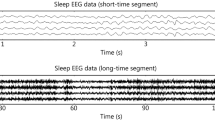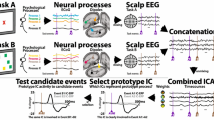Abstract
Modelling non-stationarities is an ubiquitous problem in neuroscience. Robust models help understand the underlying cause of the change observed in neuroscientific signals to bring new insights of brain functioning. A common neuroscientific signal to study the behaviour of the brain is electro-encephalography (EEG) because it is little intrusive, relatively cheap and easy to acquire. However, this signal is known to be highly non-stationary. In this paper we propose a robust method to visualize non-stationarities present in neuroscientific data. This method is unaffected by noise sources that are uninteresting to the cause of change, and therefore helps to better understand the neurological sources responsible for the observed non-stationarity. This technique exploits a robust version of the principal component analysis and we apply it as illustration to EEG data acquired using a brain-computer interface, which allows users to control an application through their brain activity. Non-stationarities in EEG cause a drop of performance during the operation of the brain-computer interface. Here we demonstrate how the proposed method can help to understand and design methods to deal with non-stationarities.
Access this chapter
Tax calculation will be finalised at checkout
Purchases are for personal use only
Preview
Unable to display preview. Download preview PDF.
Similar content being viewed by others
References
Wolpaw, J.R., Birbaumer, N., McFarland, D.J., Pfurtscheller, G., Vaughan, T.M.: Braincomputer interfaces for communication and control. Clin. Neurophysiol. 113, 767–791 (2002)
Müller, K.R., Tangermann, M., Dornhege, G., Krauledat, M., Curio, G., Blankertz, B.: Machine learning for real-time single-trial EEG-analysis: From brain-computer interfacing to mental state monitoring. J. Neurosci. Methods 167(1), 82–90 (2008)
Vidaurre, C., Kawanabe, M., von Bünau, P., Blankertz, B., Müller, K.R.: Toward an unsupervised adaptation of LDA for Brain Computer Interfaces. IEEE Trans. Biomed. Eng (2011)
Vidaurre, C., Sannelli, C., Müller, K.R., Blankertz, B.: Machine-Learning Based Co-adaptive Calibration. Neural Comput. (in press 2011)
Vidaurre, C., Sannelli, C., Müller, K.R., Blankertz, B.: Co-adaptive calibration to improve BCI efficiency. J. Neural Eng (2011) (in press)
Vidaurre, C., Krämer, N., Blankertz, B., Schlögl, A.: Time Domain Parameters as a feature for EEG-based Brain Computer Interfaces. Neural Networks 22, 1313–1319 (2009)
Blankertz, B., Sannelli, C., Halder, S., Hammer, E.M., Kübler, A., Müller, K.R., Curio, G., Dickhaus, T.: Neurophysiological Predictor of SMR-Based BCI Performance. NeuroImage 51(4), 1303–1309 (2010)
Blankertz, B., Tomioka, R., Lemm, S., Kawanabe, M., Müller, K.R.: Optimizing Spatial Filters for Robust EEG Single-Trial Analysis. IEEE Signal Process Mag. 25(1), 41–56 (2008)
Kawanabe, M., Vidaurre, C.: Improving BCI performance by modified common spatial patterns with robustly averaged covariance matrices. In: WC 2009, pp. 279–282 (2009)
Krauledat, M.: Analysis of Nonstationarities in EEG signals for improving Brain-Computer Interface performance. PhD thesis, Technische Universität Berlin, Fakultät IV – Elektrotechnik und Informatik (2008)
Lorist, M., Bezdan, E., ten Caat, M., Span, M., Roerdink, J., Maurits, N.: The influence of mental fatigue and motivation on neural network dynamics; an EEG coherence study
Author information
Authors and Affiliations
Editor information
Editors and Affiliations
Rights and permissions
Copyright information
© 2011 Springer-Verlag Berlin Heidelberg
About this paper
Cite this paper
Pascual, J., Kawanabe, M., Vidaurre, C. (2011). Modelling Non-stationarities in EEG Data with Robust Principal Component Analysis. In: Corchado, E., Kurzyński, M., Woźniak, M. (eds) Hybrid Artificial Intelligent Systems. HAIS 2011. Lecture Notes in Computer Science(), vol 6679. Springer, Berlin, Heidelberg. https://doi.org/10.1007/978-3-642-21222-2_7
Download citation
DOI: https://doi.org/10.1007/978-3-642-21222-2_7
Publisher Name: Springer, Berlin, Heidelberg
Print ISBN: 978-3-642-21221-5
Online ISBN: 978-3-642-21222-2
eBook Packages: Computer ScienceComputer Science (R0)




